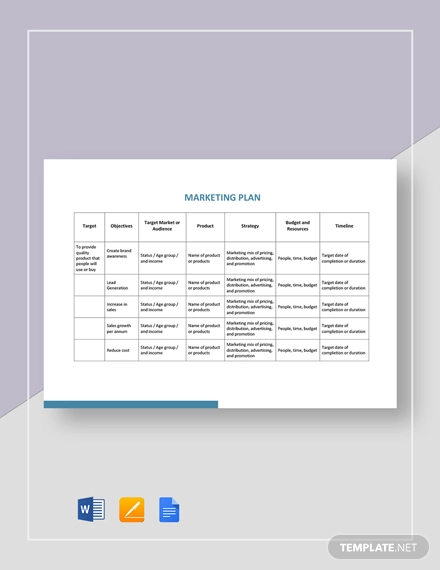Developing a real estate marketing plan is not a one-size-fits-all undertaking. You have to take note of different circumstances, factors, elements, and processes that can affect the effectiveness of a particular marketing plan to your real estate business. Do not be carried away by lengthy and persuasive real estate marketing plans.
Real Estate Marketing Plan Template

Basic Marketing Plan Template

Simple Marketing Plan Example

Real Estate Marketing Plan Example

Luxury Real Estate Marketing Plan Example
In real estate marketing, what you need to give focus on is strengthening the purpose and goal of your marketing initiatives that will be used as the base or foundation of your real estate marketing plan and implementation efforts. We have listed a variety of real estate marketing plan examples in PDF that you can use as references if you want to create your own real estate marketing plan document.
Real Estate Broker Marketing Plan Example
How to Come Up with a Real Estate Marketing Plan That Works
Making marketing plans that work is a tedious task to do and accomplish. For you to ensure the efficiency of the real estate marketing plan that you would like to develop, you have to align all the areas of the marketing plan with the needs of the real estate and the reasonable expectations of the stakeholders of the business. Listed below are some of the things that you always need to remember to ensure that you will come up with an effective real estate marketing plan.
- Real estate marketing plans can work best if they are developed based on the particular needs of your real estate business. This document can only do wonders if it can target specific concerns and issues, define the proper call-to-actions that can help the business get the trust of its potential customers and other stakeholders, and develop a professional goal that is aligned with the real estate’s nature of operations.
- Real estate marketing plans must be guided by a goal in mind. It is important for real estate agents or any entity who will use the marketing plan to be specific when it comes to the identification of the objective that they would like to achieve. Aside from this, you have to ensure that you can set priority action plans and strategies that will allow you to achieve your goal.
- Real estate marketing plans should identify the strengths and weaknesses of the business. It should also present potential risks, threats, and opportunities that the stakeholders of the real estate business must prepare for. In this manner, particular operational changes can be implemented and better options can be chosen. You may also see simple business plan examples.
Real Estate Budget and Marketing Plan Example
Real Estate Marketing Plan Example
Senior Real Estate Specialist Marketing Plan Example
Steps in Creating an Outstanding Real Estate Marketing Plan
Even if real estate marketing plans work differently from one business to another, there are still steps and guidelines that can potentially contribute to the successes of the real estate marketing plan that you will make. The steps that you can follow in creating an outstanding real estate marketing plan are listed below:
- Set goals and objectives that you would like to achieve. This can only be done if you already have a purpose or a reason on why you would like to develop a real estate marketing plan. Make sure that you will consider trends, potential successes, metrics for assessment, quality standards, and the occurrences of internal and external factors when developing a real estate marketing plan.
- Know your budget for any marketing activity, effort, or program that you would like to execute. Before developing a real estate marketing plan or implementing particular call-to-actions, you first have to set the range of the amount of money that you can allot for the undertaking. It is essential for you to work on your resources and be careful on how you will utilize them so that you can sustain the implementation of your strategies, tactics, and simple action plans.
- Know the description, activities, and purchasing power of your ideal or target market. You have to fully define your potential customers so you can be aware of the drivers that affect their buying decisions. In this way, you can incorporate strategies in your real estate marketing plan that can surely grab the attention of the people that you would like to transact with. You may also see risk plan examples.
- Be aware of the steps for building the best digital marketing plan and/or the processes that will allow you to successfully execute traditional marketing activities. You have to select the mediums and platforms that you will maximize for any real estate marketing activity. A part of your marketing plan should focus on this discussion as it is important to relay your marketing message in the right place so you can get your desired results.
- Look back at the goals and objectives that you have made. From this, identify the measures that you will use to know whether the real estate marketing plan is successful or not. This is very important as you can refer to this document for future marketing plan creation. You may also like work plan examples.
Marketing Plan for a Village Example
Marketing Plan for Selling Apartments Example
Real Estate Social Media Marketing Plan Example
Strategies and Tactics That You Can Include in a Real Estate Marketing Plan
With the number of simple marketing plan examples that you can use as references, it is essential for you to be keen with the strategies and tactics that you think can truly be helpful for your business and the implementation of the marketing plan that you are developing. Some of the strategies and tactics that you can include in your real estate marketing plan include the following:
- Resort with the usage of great photographs. Real estate marketing activities can get more attention if it can present visuals. Hire skilled and/or professional photographers that can help you present the real estate in the best and most appealing way possible. You may also see weekly plan examples.
- Get the most out of digital marketing. With the number of mobile and Internet users, you can reach a wider market if you will have digital marketing activities. You can send professional emails to your target market, develop a blog or an online page about the real estate, and even create a social media account that can help you connect with your market.
- Schedule tours, may it be personal or virtual. Presenting the qualities and characteristics of the real estate can provide a powerful touch point that can persuade potential clients to practice their purchasing power in your business. You may also like transition plan examples.
- Collaborate with marketing professionals that can help you spread the word about your business. You have to select the people that can truly bring potential clients, leads, and actual customers. This will enable you to set professional and business relationships in different levels which is a great way to promote the real estate. You may also check out sales plan examples.
Strategic Real Estate Marketing Plan Example

Strategic Marketing Plan for Real Estate Development and Market Positioning Example
Useful Tips to Make It Easier for You to Create a Comprehensive and Detailed Real Estate Market Plan
Making a real estate market plan is a process that requires your patience, consistency, and attention to detail. All areas and phases of the real estate must be reviewed so that you can incorporate its strengths and potential with the document that you will make. You may also see quality plan examples.
A few of the tips that can make it easier for you to create a comprehensive and detailed real estate market plan are as follows:
- Be thorough in discussing the content of your real estate market plan. However, you should not forget that the document must also be precise and simple. Only discuss items that truly matter.
- Ensure that all the components of a basic marketing plan are present in the real estate market plan that you are drafting. Come up with a specific executive summary and mission statement, a market analysis that can provide details to market segments, marketplace activities, existing trends and potential entryways, a budget guide, a timeline, a list of your plan’s objectives and goals, and the clear discussion of all the strategies and action plans that you will realize.
- Make the content of the real estate market plan realistic and attainable. Make sure that your action plans are time-bound and measurable so you can ensure that it will lead the real estate business to success.
Browse through the strategic marketing plan examples in this post that are directly used for real estate-related marketing activities. Make sure to get the most out of these references’ usage so you can develop a great real estate market plan that can affect and impact your business in the best way possible.












